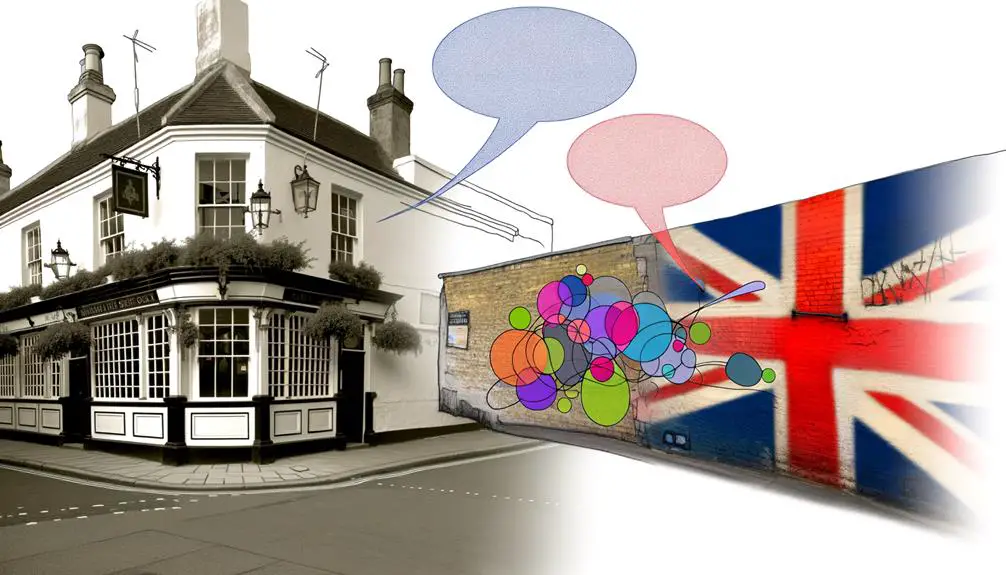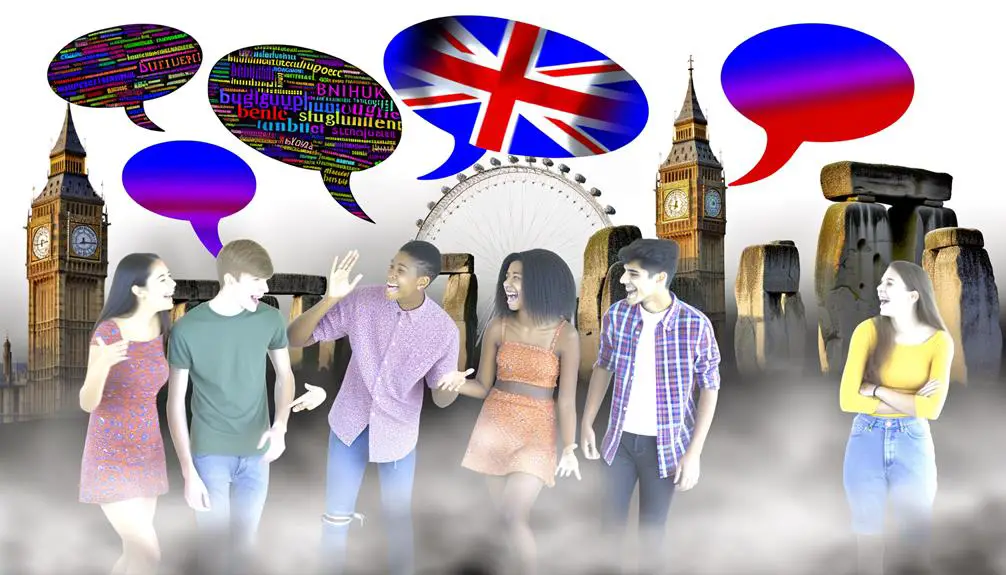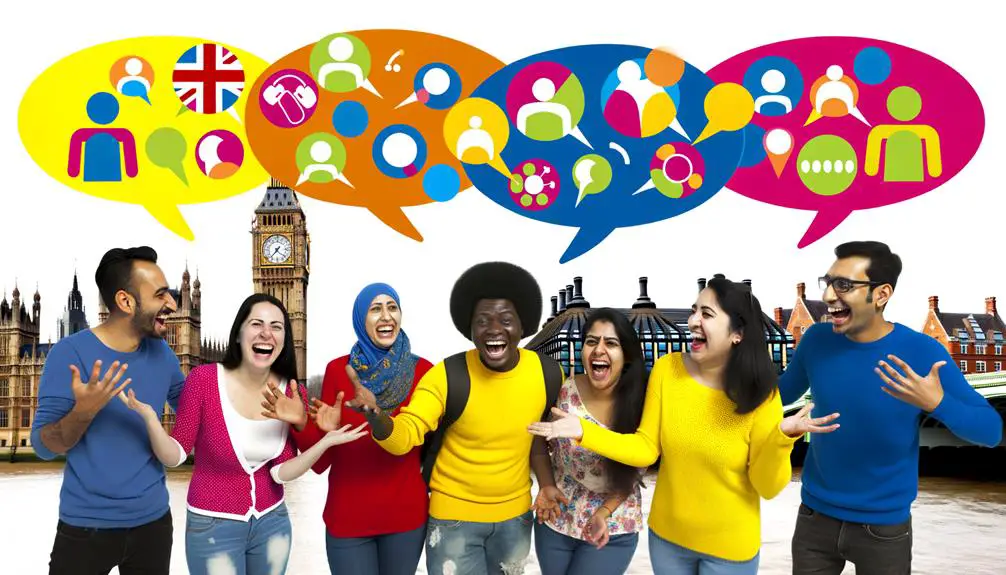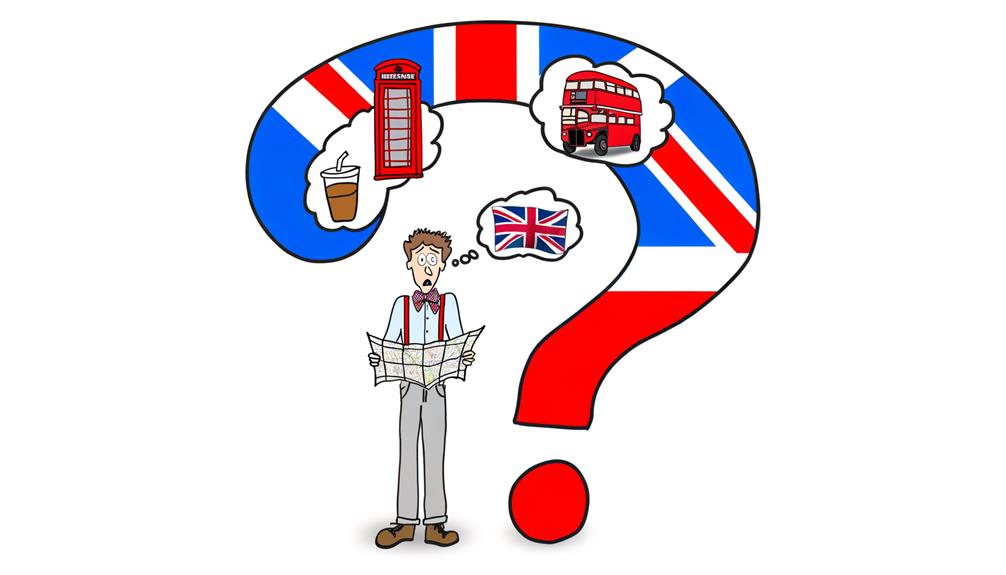In British slang, "Brazy" isn't just a quirky misspelling of "crazy." It's a term that's swaggered its way across the pond from American streets, embedding itself with a distinct British flair. It's all about actions and situations that push the envelope, mixing intensity with a bold dash of audacity. This word sums up extreme or shockingly audacious behaviors, with an undercurrent of admiration for the sheer gall it takes to pull them off. The pronunciation, emphasizing the 'br', injects an extra dose of character into conversations. Understanding "Brazy" gives you a richer grasp of contemporary British slang, promising to add layers to your understanding of its evolving landscape.
Key Takeaways
- Brazy in British slang describes actions or situations that are intensely unconventional or daring.
- It originates from a playful twist on the word 'crazy', signifying admiration or disbelief at someone's audacity.
- The term showcases the evolution and adaptability of British slang, adopting expressions from global cultures.
- Brazy is used to convey shock, awe, or sometimes recklessness, often reflecting extremity and audacity.
- Understanding the context and nuances of 'Brazy' is essential for its effective communication in British culture.
The Origins of Brazy

Delving into the origins of 'Brazy', it's crucial to understand that this slang term isn't traditionally British, but rather it has infiltrated the UK's vernacular through global cultural exchanges, particularly from American English. The term's journey from American streets to British lips is a demonstration of the power of media, music, and migration in shaping language. Brazy etymology traces back to specific subcultures within the United States, where the modification of existing words to create new meanings or to signify in-group belonging is a common linguistic practice.
The global influence on this term cannot be overstated. As American music, especially hip-hop and rap, continues to dominate global charts, the slang used within these cultural products travels far beyond the borders of the United States. British audiences, especially the youth, absorb and repurpose these terms, integrating them into their own slang lexicon. This cross-pollination of slang showcases the dynamic nature of language, where meanings and usages are not static but evolve through interaction across cultures. Understanding 'Brazy' within this framework highlights not just its American origins but its role as a linguistic bridge in a globalized world.
Brazy: Definition Unpacked
Having explored the term's cross-cultural journey, let's now examine what 'Brazy' actually means and how it's used in contemporary language. The brazy etymology reveals a fascinating blend of linguistic creativity and cultural influence. Originating from a playful twist on the word 'crazy,' brazy carries a similar connotation but is steeped in a deeper, more nuanced context.
In essence, brazy describes actions or situations that defy the norm, imbued with an intensity or wildness that goes beyond the ordinary. It's not just crazy; it's crazy to an extreme, often with an undercurrent of admiration or disbelief at the audacity or boldness of what's being described. This term encapsulates a blend of shock, awe, and sometimes a hint of recklessness.
A pronunciation guide helps to guarantee that you're not just understanding the term but also able to use it correctly. Emphasize the initial 'br' sound, almost as if you're beginning to say 'brave' but then segue into the zest of 'crazy.' The accent falls squarely on the first syllable, giving the word a punchy, emphatic feel that mirrors its meaning.
Understanding brazy in this detailed manner allows you to appreciate not just the word, but the attitude and context it conveys in contemporary language.
How Brazy Fits Into British Slang

In the intricate tapestry of British slang, 'brazy' weaves itself in as an expression that captures the essence of extremity and audacity, reflecting a unique cultural adaptation. It's a confirmation of how British integration of new slang terms is not merely about borrowing words but about embedding them deeply into the social fabric. 'Brazy' exemplifies this process, showcasing the dynamic nature of slang evolution within British culture.
| Term | Origin | British Integration |
|---|---|---|
| Brazy | American Slang | Adopted into British lexicon with local nuances |
| Mad | Traditional British | Pre-existing term for 'crazy' enhanced by 'brazy' |
| Cheeky | British Original | Maintains its charm amidst evolving slang |
This table illustrates how 'brazy', alongside traditional and inherently British terms, enriches the language's diversity. The adoption and adaptation process highlights the analytical, authoritative nature of British slang's evolution. 'Brazy' isn't just another import; it's a cornerstone of contemporary British slang, showcasing an audacity that meshes well with the British penchant for unique expressions. Through its integration, 'brazy' serves as a vivid example of how British slang continuously evolves, absorbing and repurposing elements from various cultures into something distinctly British.
The Cultural Impact of Brazy
'Brazy' has profoundly shaped cultural conversations, blending seamlessly into British vernacular and altering the dynamics of everyday dialogue. Its etymology, deeply rooted in the fusion of bravado and craziness, encapsulates a unique linguistic evolution, indicative of the fluidity and adaptability of British slang. This word not only reflects a specific attitude and approach to life but also highlights the playful creativity inherent in the evolution of language. The Brazy etymology story is a confirmation of how modern slang can quickly become ingrained in popular culture, influencing not just speech but attitudes and behaviors.
However, the rise of 'Brazy' has not been without its controversies. As it permeated various facets of British society, debates emerged around its appropriateness and the potential for misunderstanding or misuse. These Brazy controversies underscore the challenges that come with rapidly evolving language, particularly slang that originates from specific cultural or social contexts. Critics argue that such terms can sometimes reinforce stereotypes or exclude those not 'in the know', while proponents see them as enriching the linguistic tapestry, offering new ways to express complex emotions and ideas. The cultural impact of 'Brazy' is hence a fascinating lens through which to view the ongoing dialogue between language, society, and identity.
Variations and Related Terms

Exploring the linguistic landscape further, you'll find that 'Brazy' has spawned a variety of related terms and variations, enriching the lexicon with nuanced expressions and shades of meaning. The etymology of 'Brazy' itself is fascinating, indicative of how language evolves in response to cultural currents. Its pronunciation, straddling the line between brash and crazy, hints at the term's playful and sometimes rebellious connotations.
To make the exploration of its offshoots more interesting, here's a table summarizing a few related terms:
| Term | Description |
|---|---|
| Braziness | The state or quality of being 'brazy', often used to describe situations or behaviors that are wildly unconventional or daring. |
| Brazily | An adverb describing actions done in a 'brazy' manner, highlighting the intensity or unorthodoxy of the method. |
| Brazy-like | An adjective used to compare someone or something to the quintessence of 'brazy', suggesting a high level of similarity to the term's core characteristics. |
Each term adds depth to the understanding of 'Brazy', reflecting its versatility and adaptability in the face of changing social dynamics. The exploration of Brazy etymology and Brazy pronunciation within these variations reveals the richness of this slang term's evolution and its enduring appeal in the British lexicon.
Brazy in Popular Media
You've likely noticed the term 'brazy' permeating popular media, from its significant impact on the music scene to its appearance in films and usage by celebrities. This slang has transcended mere linguistic novelty, influencing artistic expressions and public personas. Understanding its usage in these contexts offers insights into how slang shapes and reflects cultural trends.
Brazys Music Scene Impact
While it may not be immediately apparent, the influence of 'Brazy' within the music scene has greatly shaped contemporary genres, offering a unique blend of sounds that resonates with a diverse audience. Brazy collaborations have become a hallmark of this impact, bringing together artists from various backgrounds to create groundbreaking music that defies traditional genre boundaries. These partnerships not only enrich the music industry with innovative sounds but also foster a sense of community among artists and fans alike. Furthermore, Brazy merchandising has played a pivotal role in popularizing the term, with fans donning apparel and accessories that celebrate this cultural phenomenon. This merchandising strategy has not only boosted the term's visibility but also solidified its place in the music industry's lexicon, ensuring its longevity and relevance.
Films Featuring Brazy Term
Beyond its resonance in the music industry, the term 'Brazy' has also made significant inroads into popular media, particularly through its inclusion in various films. This integration into cinematic narratives isn't just a nod to contemporary slang but enhances character development and reflects unique cinematography styles. Here's how:
- Character Development: Characters using 'Brazy' often exhibit a rebellious or unconventional nature, adding depth and authenticity.
- Dialogue: Incorporating 'Brazy' into scripts modernizes the dialogue, making characters more relatable to a younger audience.
- Setting: Films set in urban environments use 'Brazy' to convey the intensity and pace of city life.
- Cinematography Styles: Directors leverage 'Brazy' moments to experiment with dynamic, unconventional shooting techniques, enriching the visual storytelling.
This strategic use of 'Brazy' in films underscores its cultural significance while pushing the boundaries of traditional cinematic expression.
Celebrities Using Brazy Publicly
Numerous celebrities have openly embraced 'Brazy' in their public personas, signaling a trend that merges street vernacular with mainstream media spotlight. This adoption isn't just in their spoken language but extends to celebrity fashion, where bold, unconventional choices become emblematic of the 'Brazy' attitude. Such public displays often spark wide-ranging reactions, from admiration to critique, highlighting a societal divide in the acceptance of street-inspired culture within high-profile circles. You'll find that the influence of these celebrities has a significant impact, not only setting trends but also shaping public perceptions of what's considered acceptable or desirable in both language and style. Their usage of 'Brazy' acts as a barometer for the evolving dynamics between street culture and mainstream acceptance, making it a fascinating study in cultural integration and public reactions.
Misconceptions About Brazy
Many people mistakenly believe that 'brazy' is simply a misspelling or a slang version of 'crazy,' failing to recognize its unique connotations and usage in British slang. This misunderstanding undermines the rich, nuanced language landscape from which 'brazy' emerges. To clear up some of these misconceptions, consider the following points:
- Brazy Pronunciation: Unlike 'crazy,' 'brazy' often carries a softer pronunciation, aligning with certain British dialects. Misinterpreting this can lead to incorrect usage and misunderstanding in social contexts.
- Cultural Significance: It's not just a word; it's an expression deeply embedded in contemporary British culture, reflecting attitudes, emotions, and sometimes, social issues.
- Brazy Controversies: The term has sparked debates around its origins and appropriateness. Some argue it's a playful linguistic twist, while others see it as contributing to the erosion of 'proper' English. Understanding these controversies is key to grasping the word's complexity.
- Not Merely a Synonym for 'Crazy': 'Brazy' can denote a range of experiences and states of being that 'crazy' cannot, making it a unique addition to the lexicon rather than a simple alteration.
Using Brazy in Everyday Conversation

Incorporating 'brazy' into your everyday conversation demands an understanding of its social context and the phrases that naturally accommodate it. You'll find that its usage can greatly vary, reflecting nuanced meanings or emotions, depending on the situation at hand. Grasping these subtleties guarantees you communicate effectively, avoiding potential misunderstandings while enriching your linguistic repertoire.
Brazys Social Context
Within the tapestry of British slang, 'brazy' occupies a unique position, often surfacing in conversations among youths to describe situations or experiences that are wildly out of the ordinary or beyond belief. Its usage, however, is nuanced and requires an understanding of:
- Brazy Etiquette: Knowing when and how to use 'brazy' is important. It's reserved for moments that genuinely shock or surprise.
- Regional Differences: The term's prevalence and acceptance can vary greatly across the UK, affecting its reception.
- Audience Awareness: Gauge the familiarity of your listeners with slang to avoid confusion.
- Contextual Appropriateness: 'Brazy' fits best in informal settings among peers, not in professional or formal environments.
Navigating these aspects ensures that 'brazy' enriches conversation, maintaining its spirited essence without crossing lines of respect or clarity.
Phrases Incorporating Brazy
When you weave 'brazy' into everyday conversations, it's important to strike a balance between relatability and the unique flair it adds to your dialogue. Understanding brazy origins is essential to appreciate the depth and versatility of its usage. Initially rooted in specific cultural contexts, 'brazy' has transcended its beginnings to become a vibrant expression of astonishment or disbelief. Its integration into phrases amplifies the emotional resonance, making statements not just heard but felt. For instance, saying 'That's absolutely brazy!' can convey a stronger, more vivid reaction than traditional adjectives. As you navigate brazy usage, remember: its power lies not just in the novelty but in its ability to connect and convey emotions with precision, enriching conversations with texture and color.







